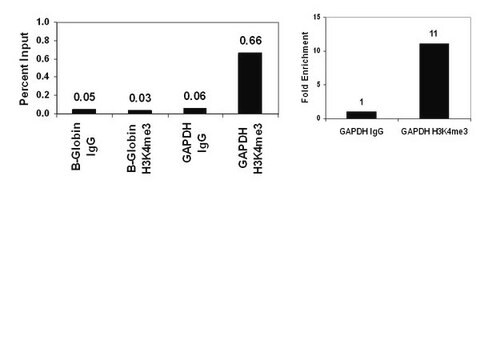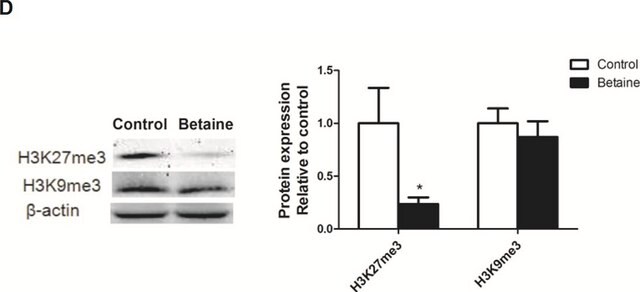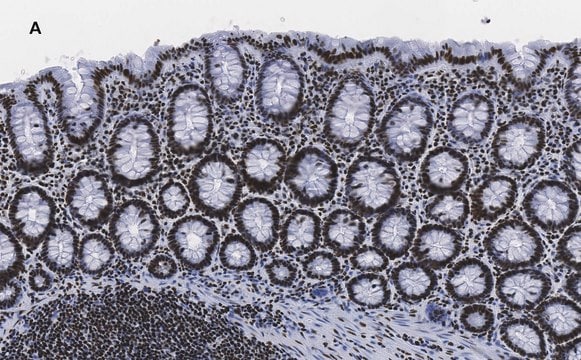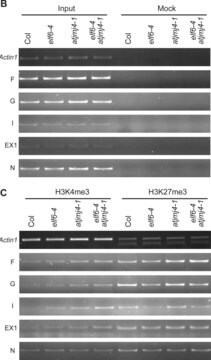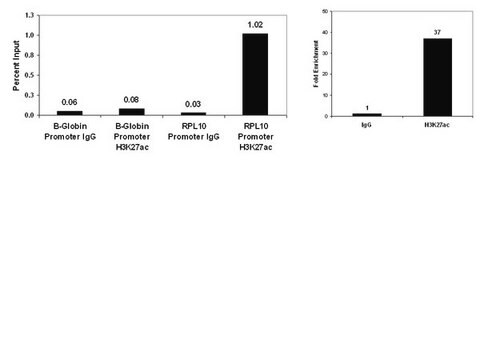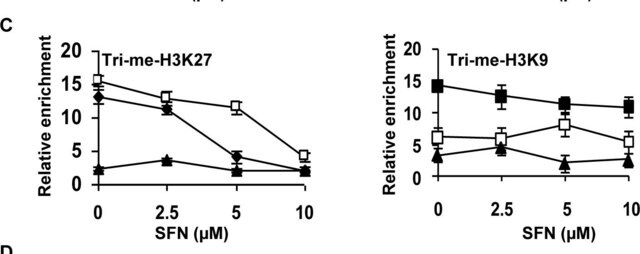17-614
ChIPAb+ Trimethyl-Histone H3 (Lys4) - ChIP Validated Antibody and Primer Set, rabbit monoclonal
from rabbit
Synonym(s):
Chip Rabbit Antibody and primer set, H3K4me3 ChIP, H3K4me3, Histone H3 (tri methyl K4), Histone H3K4me3, Histone H3K4me3 ChIP
About This Item
Recommended Products
biological source
rabbit
Quality Level
clone
monoclonal
species reactivity
mouse, human
species reactivity (predicted by homology)
mammals
manufacturer/tradename
ChIPAb+
Upstate®
technique(s)
ChIP: suitable (ChIP-seq)
western blot: suitable
isotype
IgG
NCBI accession no.
UniProt accession no.
shipped in
dry ice
Gene Information
human ... H3F3B(3021)
General description
The ChIPAb+ Trimethyl-Histone H3 (Lys4) set includes the anti-trimethyl-histone H3 (Lys4) antibody, a negative control antibody (normal rabbit serum), and qPCR primers which amplify a 166 base pair region within the promoter of the human GAPDH gene. The trimethyl-histone H3 (Lys4) and negative control antibodies are supplied in a scalable "per ChIP" reaction size and can be used to functionally validate the precipitation of trimethyl-histone H3 (Lys4)-associated chromatin.
Specificity
Immunogen
Application
Sonicated chromatin prepared from untreated or UV treated (6 hrs, 50 joules/m2.) U2OS cells (3 X 106 cell equivalents per IP) was subjected to chromatin immunoprecipitation using 3 μL of rabbit Anti-Trimethyl Histone H3 (Lys4) and the Magna ChIP A (Cat. # 17-610) Kit. Immunoprecipitation of trimethyl histone H3 (Lys4) associated DNA fragments was verified by qPCR using ChIP Primers p21 flanking the human p21 promoter that contains an Sp1 binding site (Please see figures).
Fold Increase is a ratio of normalized mean IP quantities extracted from standard curves derived from inputs of each chromatin sample. Trimethyl-histone (Lys4) immunoprecipitable activity associated with this promoter increases with UV treatment as observed in other studies.
Please refer to the EZ-Magna A ChIP (Cat. # 17-408) or EZ-ChIP (Cat. #17-371) protocol for experimental details.
ChIP-seq Analysis:
Chromatin immunoprecipitation was performed using the Magna ChIP HiSens kit (17-10460), 3 µL anti-trimethyl-Histone H3 (Lys4) antibody (cat# 17-614) or, 20 µL Protein A/G beads, and 1e6 crosslinked HeLa cell chromatin followed by DNA purification using magnetic beads. Libraries were prepared from Input and ChIP DNA samples using standard protocols with Illumina barcoded adapters, and analyzed on Illumina HiSeq instrument. An excess of eighteen million reads from FastQ files were mapped using Bowtie (http://bowtie-bio.sourceforge.net/manual.shtml) following TagDust (http://genome.gsc.riken.jp/osc/english/dataresource/) tag removal. Peaks were identified using MACS (http://luelab.dfci.harvard.edu/MACS/), with peaks and reads visualized as a custom track in UCSC Genome Browser (http://genome.ucsc.edu) from BigWig and BED files. The highest 25% of peaks identified in the 17-614 and 07-473 datasets showed 99% overlap with peaks identified in the ENCODE H3K4me3 BROAD Histone track for HeLa S3.
Western blot analysis and peptide inhibition:
Representative blot. HeLa acid extract was resolved by electrophoresis, transferred to nitrocellulose and probed with anti-trimethyl-histone H3 (Lys4) (1:2,000, lane 1) or preincubated with 0.4 μM Histone H3 peptide with following modifications Lane 2: monomethyl-Lysine 4, Lane 3: dimethyl Lysine 4, Lane 4: trimethyl-Lysine 4.
Proteins were visualized using a goat anti-rabbit secondary antibody conjugated to HRP and a chemiluminescence detection
system (Please see figures).
Epigenetics & Nuclear Function
Chromatin Biology
Packaging
Components
Negative ChIP Control Rabbit IgG, 1 vial
ChIP Primers GAPDH, 1 vial
Quality
Sonicated chromatin prepared from untreated HeLa cells (1 X 106 cell equivalents) was subjected to chromatin immunoprecipitation using 3 μL of either a normal rabbit IgG or 3 μL Anti-Trimethyl-Histone H3 (Lys4) Monoclonal IgG and the Magna ChIP A (Part # 17-610) Kit. Successful immunoprecipitation of
trimethyl-histone H3 (Lys4) associated DNA fragments was verified by qPCR using control ChIP Primers flanking the human GAPDH promoter (Please see figures). Please refer to the EZ-Magna A ChIP protocol for experimental details.
Target description
Physical form
Normal Rabbit IgG. One vial containing 75 μL of normal rabbit IgG.
Control Primers. One vial containing 75 μL of 5 μM of each primer specific for human GAPDH.
FOR: TAC TAG CGG TTT TAC GGG CG
REV: TCG AAC AGG AGG AGC AGA GAG CGA
Storage and Stability
Analysis Note
Included negative control antibody purified rabbit IgG and control primers specific for human GAPDH promoter.
Legal Information
Disclaimer
Storage Class Code
10 - Combustible liquids
Regulatory Listings
Regulatory Listings are mainly provided for chemical products. Only limited information can be provided here for non-chemical products. No entry means none of the components are listed. It is the user’s obligation to ensure the safe and legal use of the product.
JAN Code
17-614:
Certificates of Analysis (COA)
Search for Certificates of Analysis (COA) by entering the products Lot/Batch Number. Lot and Batch Numbers can be found on a product’s label following the words ‘Lot’ or ‘Batch’.
Already Own This Product?
Find documentation for the products that you have recently purchased in the Document Library.
Our team of scientists has experience in all areas of research including Life Science, Material Science, Chemical Synthesis, Chromatography, Analytical and many others.
Contact Technical Service